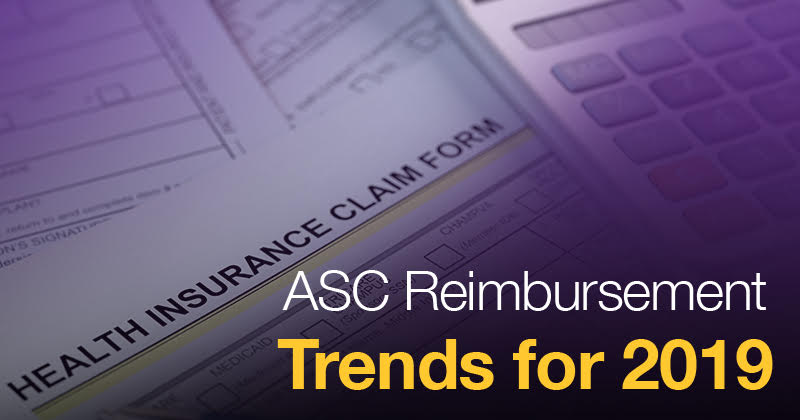2019 ASC Reimbursement: 5 Key Changes for Gastroenterologists

Top Ambulatory Surgery Center Trends From CMS’ 2019 Medicare ASC Fee Schedule
In the gastroenterology industry, ambulatory surgery centers (ASCs) are drawing increasing market emphasis because of their potential to be profitable for doctors yet cost-effective for patients and the healthcare system overall. But what exactly is changing for ASC reimbursement now that the Medicare 2019 Payment Final Rule is in effect? Let’s take a look at the key industry trends you should be keeping your eye on.
Background
Compared to hospital outpatient departments (HOPDs), gastroenterology ambulatory surgery centers can typically perform procedures at a much lower cost. In fact, according to a 2018 Regent Surgical Health report, procedures performed in an ASC setting cost Medicare 53 percent of the amount paid to HOPDs. In addition, the healthcare system could save more than $2.3 billion per year if patients underwent certain preventive and surgical procedures at ASCs instead of HOPDs. This cost-effectiveness is made possible in large part by the efficiency, specialization, flexibility and predictable scheduling of ASCs compared to HOPDs.
Moreover, as the ASC Quality Reporting Program has demonstrated, this decrease in cost doesn’t come at the expense of quality or patient safety. There is even some evidence that ASCs can actually provide superior patient experiences and outcomes as compared to HOPDs. This makes ASCs an effective option for helping lower healthcare costs as the industry increasingly shifts from fee-for-service to value-based care. As a result, CMS has publicly stated that it aims to shift more surgical procedures from HOPDs to ASCs when clinically appropriate.
1. ASC reimbursements increase by 2.1% for 2019
To incentivize providers to perform more procedures at an ASC instead of an HOPD, CMS’ 2019 Medicare ASC Fee Schedule increased ASC reimbursements by an average of 2.1 percent per procedure for 2019. This is nearly a full percent higher than the HOPD average rate increase of just 1.35 percent.
Gastroenterology ASC reimbursements still remain much lower than HOPD reimbursements, but the discrepancy in the 2019 rate increase narrows the gap just a little, a trend that may be continued in future years. Moreover, in an efficient ASC, the lower gastroenterology reimbursements per procedure compared to HOPDs may be offset by a higher overall case volume. Amid declining office visit reimbursements, this represents a valuable opportunity for ASCs to become more profitable and expand their role as an important ancillary revenue source for gastroenterologists.
2. Ambulatory surgery centers moved to HOPD market basket
In addition to the 2019 rate increase, the 2019 Medicare ASC Fee Schedule made gastroenterology ASC reimbursement rates more competitive with HOPD reimbursements in terms of future updates. In the past, ASC rates were based on the Consumer Price Index for All Urban Consumers, the inflation measure used for consumer goods such as milk and bread. Meanwhile, hospital rates were tied to a separate hospital market basket, which has been historically higher because it measures the cost of medical expenses.
Now, ASCs are tied to the hospital market basket as well, which CMS hopes will further incentivize performing procedures in ASCs over HOPDs. CMS also hopes to prompt more ASCs to open in areas that currently have few or none, which would improve patient access to more cost-effective care.
3. Procedure Price Lookup tool introduced
Continuing the emphasis on cost-effectiveness, CMS’ Medicare 2019 Payment Final Rule rolled out the Procedure Price Lookup website. This free online tool estimates how much patients will have to pay for a procedure at an ASC vs. an HOPD. When patients see how much lower the copays are for gastroenterology ASC procedures, they’ll be more likely to choose them over hospitals. This, in turn, will help increase ASC revenue and lower overall healthcare costs.
4. Definition of surgery expanded
For 2019, CMS reexamined the new procedure codes that were added to the ASC Medicare covered procedures list in the past several years. They determined that they would continue to reimburse them because the list continues to reflect clinical best practices. However, they have paved the way for new procedure codes to be added to this list in coming years.
In addition to helping increase the percentage of surgeries performed at gastroenterology ambulatory surgery centers vs. hospitals, CMS is expanding the types of ASC covered procedures to include more “surgery-like” services. For 2019, CMS expanded their definition of “surgery” to include 12 cardiac catheterization procedures and added 5 additional cardiac catheterization procedures to the CMS ASC approved procedure list.
While this does not directly impact GI, it opens the door for future expansions that may include gastroenterology procedures. Of course, higher-risk procedures that require complex anesthesia or close-by surgeons to help manage complications may still need to be performed at hospitals. But as ASCs continue to successfully demonstrate the ability to safely perform more and more different types of procedures, it’s likely that CMS will add new reimbursable procedures for surgery centers with the right expertise. And even if only a few procedure types are shifted over to ambulatory surgery centers, the impact on lowering overall costs for the system can be substantial.
5. Device-intensive procedure definition expanded
Last but not least, the 2019 Medicare ASC Fee Schedule aims to incentivize providers to bring in more device-intensive procedures to gastroenterology ASCs. In previous years, a device-intensive procedure was defined as one with a device offset greater than 40 percent based on the standard OPPS APC rate-setting methodology. For 2019, but CMS has lowered this threshold to 30 percent. Within the ASC environment, this will contribute to increased utilization of procedures with relatively high-cost medical devices.
Conclusion
Overall, CMS’ changes boil down to one main goal: reimburse more ASCs and fewer hospital outpatient departments for appropriate outpatient procedures. By shifting more procedures from HOPDs to ASCs, CMS can take advantage of ASCs’ cost-effectiveness to help save money for the entire healthcare system.
And since Medicare sets the standard for gastroenterology reimbursement in the industry, insurance companies will likely follow suit and begin favoring ASCs over HOPDs in coming years. As the industry moves towards value-based care over fee-for-service, this shift will ultimately serve CMS’ broader goal of decreasing overall healthcare costs while improving quality and outcomes.
References
CMS finalizes Medicare Hospital Outpatient Prospective Payment System and Ambulatory Surgical Center Payment System changes for 2019 (CMS-1695-FC). CMS.gov. https://www.cms.gov/newsroom/fact-sheets/cms-finalizes-medicare-hospital-outpatient-prospective-payment-system-and-ambulatory-surgical-center. Published November 2, 2018. Accessed February 28, 2019.
Dyrda L. 10 key business trends for GI physicians and centers in 2018 & beyond. Becker’s ASC Review. https://www.beckersasc.com/gastroenterology-and-endoscopy/10-key-business-trends-for-gi-physicians-and-centers-in-2018-beyond.html. Published August 29, 2018. Accessed February 28, 2019.
Dyrda L. ASCs to receive 2.1% increase in 2019 Medicare reimbursement: 6 things to know. Becker’s ASC Review. https://www.beckersasc.com/asc-coding-billing-and-collections/ascs-to-receive-2-1-increase-in-2019-medicare-reimbursement-6-things-to-know.html. Published November 3, 2018. Accessed February 28, 2019.
Fontana E, Hawes K. CMS hospital outpatient rule dropped this morning: 3 highlights you need to know. Advisory Board. https://www.advisory.com/research/revenue-cycle-advancement-center/at-the-margins/2018/11/final-hopps. Published November 2, 2018. Accessed February 28, 2019.
HOPD to ASC Conversion: Now or Later With Transition to Value-Based Care. Regent Surgical Health; 2018. https://ss-usa.s3.amazonaws.com/c/2236/media/5ac3c9ae0b59f/RSH-HOPD-0318.pdf. Accessed February 28, 2019.
Popa R. 6 ASC reimbursement trends to know. Becker’s ASC Review. https://www.beckersasc.com/asc-coding-billing-and-collections/6-asc-reimbursement-trends-to-know.html. Published January 29, 2019. Accessed February 28, 2019.
Popa R. ASC wins & opportunities: CMS’s 2019 final rule, ASC Payment Transparency Act & more. Becker’s ASC Review. https://www.beckersasc.com/asc-turnarounds-ideas-to-improve-performance/asc-wins-opportunities-cms-s-2019-final-rule-asc-payment-transparency-act-more.html. Published February 7, 2019. Accessed February 28, 2019.
Popa R. Competition in outpatient surgery how to prepare for the Amazon of ASCs: 4 Qs with Dr. Manoj Mehta. Becker’s ASC Review. https://www.beckersasc.com/gastroenterology-and-endoscopy/preparing-for-the-amazon-of-the-asc-industry-3-qs-with-gi-leader-dr-manoj-mehta.html. Published February 6, 2019. Accessed February 28, 2019.
Procedure Price Lookup. Medicare.gov. https://www.medicare.gov/procedure-price-lookup/. Accessed February 28, 2019.





